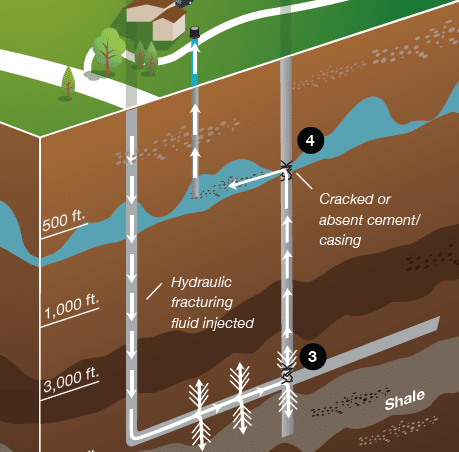Hydraulic fracturing, or fracking, has been known by the EPA to contaminate underground sources of drinking water since 1987. In a 25-year old investigative report, discovered by the Environmental Working Group (EWG) and Earthjustice, the EPA outlines how fracking for shale gas contaminated a domestic water well in West Virginia.
In a full-length report, called “Cracks in the Façade,” the EWG describes how the uncovered document contradicts the gas industry’s claim that there are no documented cases of water contamination due to fracking.
The EPA found that fluid from a shale gas well more than 4,000 feet deep contaminated well water and that the incident was “illustrative” of pollution problems associated with oil and gas drilling. With now-uncharacteristic candor, the EPA report outlines how the contamination occurs: “During the fracturing process…fractures can be produced, allowing migration of native brine, fracturing fluid and hydrocarbons from the oil or gas well to a nearby water well. When this happens, the water well can be permanently damaged and a new well must be drilled or an alternative source of drinking water found.”
The report also describes how the EPA’s investigation into the contamination case was obstructed by confidentiality agreements signed between the gas industry and affected landowners.
The EPA reported that the gas industry mostly settled out of court: “In addition to concealing the nature and size of any settlement entered into between the parties, impoundment curtails access to scientific and administrative documentation of the incident.”
The resurrected report is significant for the fracking debate, in which the issue of water contamination is central. Despite the importance of the EPA’s findings, neither the EPA nor Congress have ever cited the damning report.
In an interview with a former EPA official who worked on the 1987 report, the EWG found that numerous additional cases of groundwater contamination from fracking were also known about by the federal agency, but confidential legal settlements hampered further investigations.
The EWG says the discovered report brings the EPA’s integrity into question. It is unclear why the EPA did not cite its own findings in a subsequent and now largely delegitimized report on fracking in 2004. The 2004 report, which claimed fracking in coal bed methane presented no danger to drinking water, was pivotal in the passing of the 2005 Energy Policy Act which exempted the process from federal oversight. The EPA stressed that they studied only coal bed methane because they had “not heard concerns from citizens regarding any other type of hydraulic fracturing,” despite their own 1987 findings to the contrary.
These concerns over the EPA’s commitment to public health and safety are especially relevant, writes the EWG, as the body’s current two-year study of fracking is underway.
The additional studies, interviews and official documents included in EWG’s report confirm the importance of the EPA’s much-needed review of the process.
The EWG concludes that their “investigation established that hydraulic fracturing poses significant risks to the drinking water sources on which more than 100 million Americans depend. The EPA’s report, combined with industry and government papers showing that fractures can spread unpredictably and can intersect with adjacent wells, strongly indicate that hydraulic fracturing puts these water supplies in danger.”
Subscribe to our newsletter
Stay up to date with DeSmog news and alerts






